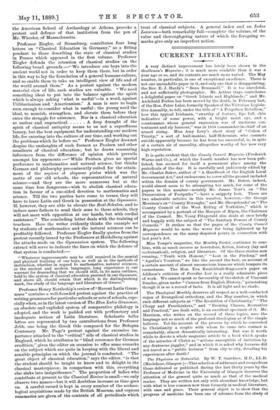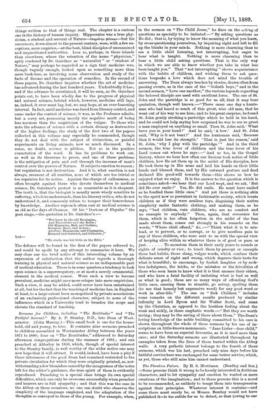The Physician as Naturalist. By W. T. Gairdner, M.D., LL.D.
(Maclehose, Glasgow.)—This selection of addresses and essays from those delivered or published during the last thirty years by the Professor of Medicine in the University of Glasgow deserves the attention of the general quite as much as that of the medical reader. They are written not only with abundant knowledge, but with what is less common now than formerly in medical literature, with ease and grace. Their general object is to show that the progress of medicine has been one of advance from the study of things written to that of things real. The chapter is a curious one in the history of human inquiry. Hippocrates was a true phy- sician, a student and servant of Natnre—inienefear owecur—but his successors, down almost to the present century, were, with a few ex- ceptions, mere empirics,—at the best, blind disciples of unexamined and unquestioned authorities. Less so, perhaps, in these islands than elsewhere, where the retention of the name "physician," aptly rendered by Dr. Gairdner as " naturalist " or "student of Nature," may perhaps be regarded as a sign that medicine was, though vaguely enough, looked upon as something more than mere book-lore, as involving some observation and study of the facts of disease and the operation of remedies. In the second of these papers, Dr. Gairdner inquires whether the art of medicine has advanced during the last hundred years. Undoubtedly it has ; and if the advance be scrutinised, it will be seen, as Dr. Gairdner points out, to have been wholly due to the progress of physical and natural science, behind which, however, medicine still lags, as, indeed, it ever must lag, but, we may hope, at an ever-lessening interval. In fact, until medicine was freed from literary control, and came under the control of science, it was, as the Professor admits, but a sorry art, possessing merely the negative merit of being less nocuous than the empiricism of the vulgar. To those who note the advance of science with a certain dismay as destructive of the higher feelings, the study of the first two of the papers collected in this volume may especially be commended, though they do not deal with the subject of vivisection, or painful experiments on living animals, now so much discussed. In a sense, no doubt, science is pitiless. Not so in the positive connotation of the word. It has its problems to work out, as well as its theorems to prove, and one of these problems is the mitigation of pain and evil through the increase of man's control over the powers of Nature. It subjects emotion to reason ; but regulation is not destruction. And it is, what emotion is not always, reverent of all realities, none of which are too trivial or too repulsive for its notice. Against the charge of callousness, so often brought against those who devote themselves to medical science, Dr. Gairdner's protest is as reasonable as it is eloquent. The truth is, that the biologist is usually more wisely sensitive to suffering, which he understands, than his literary critics, who do not understand it, and commonly refuse to temper their benevolence by knowledge. Another reproach often cast at medical science is as old as the days of Chaucer. Of his " Doctour of Physike " the poet sings,—the quotation is Dr. Gairdner's " Wel knew he the old Esmdapius, And Dioscorides and eke Rufus ; Old Hippocras, Halt and Gallien ; Berapion, Regis, and Avicen ;
Averrois, Damascene, and Constantin, Bernard and Gatisden, and Gilbertin ;"
but—
"His Annie was bat little on the Bible."
The defence will be found in the first of the papers referred to, and would be spoilt by any attempt to summarise it here. We may close our too brief notice of this interesting volume by an expression of satisfaction that the author regards a thorough training in physical and natural science as an indispensable part of medical education. There is in some quarters a tendency to look upon science in a supererogatory, or at most a merely ornamental, element in the medical course. Were such a view to become prevalent, medicine might once more relapse into mere empiricism. Such a view, it may be added, could never have been entertained at all, but for the fact that the teaching of medicine has, in England at least, to a large extent been monopolised by private associations of an exclusively professional character, subject to none of the influences which in a University tend to broaden the scope and elevate the standard of teaching.







































 Previous page
Previous page